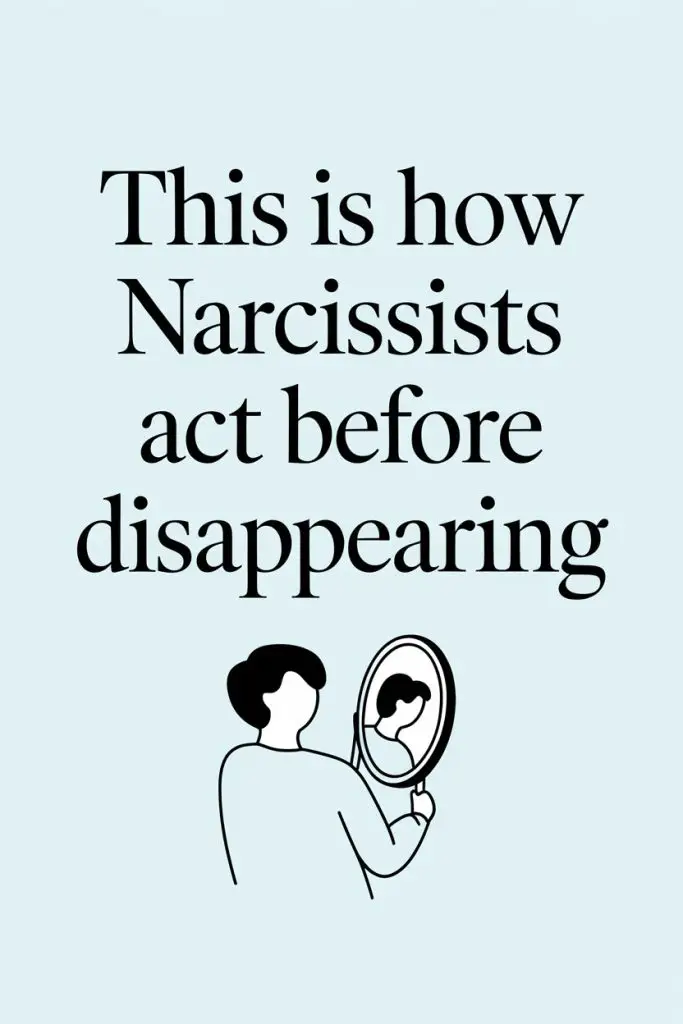There’s a strange chill in the air before a narcissist vanishes from your life. You sense it in your bones. Maybe you’re googling their odd behaviour at 2 a.m., clutching your phone, wondering if you’re being paranoid or if something really is off.
Spoiler: you’re not imagining things. Narcissists tend to follow a script (albeit a twisted one) before they withdraw—sometimes for good, sometimes just long enough to lure you back.
Let’s peel back the curtain and shine a light on the things narcissists usually do before they pull their disappearing act. Grab your emotional snack of choice; it’s going to be an eye-opener.
The Sudden Shift Into Coldness
Remember when you were the centre of their universe? Suddenly, you’re getting the emotional equivalent of a dial tone.
Narcissists often switch from affectionate to icy, practically overnight. You find yourself replaying old texts just to prove to yourself they once cared.
They might respond to your messages with one-word answers or ghost you for hours. It’s like they’ve swapped out their heart for a brick and expect you not to notice.
This coldness isn’t random; it’s calculated. They’re testing just how little they can give you before you call them out.
Picking Fights Over Nonsense
A narcissist gearing up to disappear suddenly finds your choice of breakfast offensive. That shirt you wore? Apparently, it “says a lot.”
They’ll pick at small things, turning minor annoyances into full-blown debates worthy of a prime-time slot.
It’s not really about your cereal or your clothes. This is their way of creating emotional distance. If they can paint you as the problem, it’s easier for them to justify vanishing.
Bonus: you’re left questioning yourself instead of their motives.
The Vanishing Act With Their Words
Communication from a narcissist becomes as rare as a unicorn sighting. Good morning texts dry up. Calls go unanswered.
Planning anything together? Forget it; they’re suddenly “swamped,” “tied up,” or “going through a lot right now.”
Narcissists want you to feel unimportant, like chasing after them is your full-time occupation. This sudden silence is a power play. They want you to notice the void they’ve created—and to scramble, trying to fill it.
Drumming Up Drama Out of Thin Air
Here’s an Oscar-worthy move: when a narcissist’s patience is wearing thin, they manufacture chaos.
Maybe they accuse you of being too needy (for wanting a reply to your text), or claim you’re “not supportive enough” when you haven’t even heard what’s supposedly gone wrong.
If the drama isn’t coming from you, they’ll drag in outside villains: a toxic ex, a jealous coworker, society at large. Anything to redirect your focus.
This is distraction with a capital D, keeping you off-balance and less likely to notice the bigger pattern—like the way they’re pulling away.
Rewriting History Faster Than Wikipedia
Suddenly, all those lovely memories you shared are painted as “crazy,” “overblown,” or “not how it happened.” You remember that adorable night in, but now they claim you were “too intense.”
That incredible weekend away? Apparently, you “ruined it” with your questions.
This revisionist streak usually ramps up before they disappear. It’s the narcissist’s way of scrubbing the past clean before they slam the door.
If they can convince you it was all bad, leaving feels justified in their mind—and you’re left confused, second-guessing your entire experience.
Playing the Victim Card
Ever notice how narcissists always trip and fall face-first into victimhood when things get tough? When they sense you’re catching on or starting to pull away yourself, they suddenly morph into the wounded party.
They’ll talk about how “hard” it is to trust, how they’ve “been hurt before,” or how “nobody ever understands them.” If you try to discuss their distant behaviour, you’re the mean one for “attacking” them.
This emotional judo is meant to make you feel guilty for asking for basic decency.
Miraculous New Interests and Friends
Just when you thought you were their partner-in-crime, they’ve got a brand-new friend group, or they’ve suddenly discovered a burning passion for salsa dancing or cryptocurrency (usually something you’re not involved in).
Narcissists often ramp up outside interests before disappearing. It’s a handy excuse for why they’re not around—and, let’s be honest, it gives them a ready-made audience for their next performance.
New supply, as the pros call it, is the narcissist’s favourite flavour.
Teasing the Breakup, Then Backtracking
A narcissist rarely leaves without a little foreshadowing. They might drop hints: “Maybe we need a break,” or “I’m not sure if I’m happy.”
Yet, when you react, they backpedal. “You’re overreacting! I just needed space.”
These mixed signals give them deniability. If you bring it up later, they’ll claim they never meant to end things. This keeps you tiptoeing, anxious not to “push them away”—never mind that they’re already halfway out the door.
Acting Overly Busy With Vague Excuses
Plans fall apart. Suddenly, they’re working late every night, got “family stuff,” or hit by mystery illnesses. You get vague updates that sound suspiciously like the plot to a bad soap opera.
Narcissists love a schedule packed with plausible deniability. They’re not ignoring you—they’re just “overwhelmed” (again). You’re left feeling like a needy nuisance for asking for a little quality time.
Love-Bomb Withdrawal
Early on, you probably felt like the star of a one-person romance movie. Gifts, compliments, and passionate declarations—then, poof. Nothing.
The switch from too much attention to none is a trademark move. This withdrawal is meant to make you crave their affection and wonder what you did wrong.
It’s not your fault. They’re simply moving to the next stage of the cycle: devalue, discard, disappear.
Gaslighting Goes Into Overdrive
Before a narcissist disappears, you’ll notice a sudden uptick in gaslighting. You ask about their coldness, and they act like you’re imagining things (“You’re just insecure”).
You question their commitment, and they laugh it off or turn the tables.
Suddenly, you’re apologising for things you never did. You wonder if you’re too sensitive. This psychological smoke screen is designed to leave you lost and vulnerable—perfect for a clean getaway.
Acting Like They Never Cared
As the curtain falls, their behaviour becomes shockingly callous. No sweet goodbyes, no closure. You might hear, “We were never that serious,” or “I never promised you anything.” It’s as if your relationship never existed.
This gut-punch approach saves them the trouble of dealing with messy emotions (yours, mainly). If they can convince you it meant nothing, they can leave guilt-free.
Breadcrumbing for Future Drama
When narcissists disappear, they rarely vanish forever. Expect a stray “Hey stranger” text or a random like on your old Instagram post months down the line.
They drop these tiny reminders so you don’t fully move on. Keeping the door ajar means there’s always a chance for them to slide back in—especially if they’re in need of attention or their latest conquest didn’t work out.
You Start Feeling Like the Crazy One
Here’s the final sign: you’re left doubting your reality. You replay conversations, question your worth, and wonder if you’re the one with issues.
Spoiler: you’re not. That confusion is a direct result of the narcissist’s emotional gymnastics. Feeling off-balance is practically their autograph.
Turning the Tables
Spotting these signs isn’t about outwitting a narcissist or holding onto your dignity by a thread. It’s about reclaiming your own clarity.
These behaviours aren’t just random; they’re part of a pattern designed to keep you chasing, doubting, and apologising.
Start trusting those gut feelings. If someone makes you feel small, uncertain, or constantly to blame, you deserve better—full stop. No fancy psychology degree required.
Set boundaries like your sanity depends on it, because it just might. When you recognise the storm brewing, you can choose when to grab your umbrella—or just leave the weather altogether.
If these behaviours sound all too familiar, know that you’re not alone. There’s nothing wrong with needing reassurance, or wishing things had turned out differently.
But the disappearing act isn’t about you—it’s their own pattern, on repeat.
You’re allowed to step out of their script and write your own story, with or without dramatic exits. The power lies with you—and frankly, that’s the best plot twist of all.


